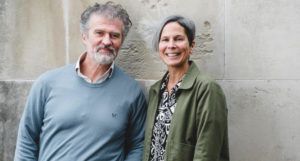New programme to move potential MND drugs into clinical trials faster

Photo by Polina Tankilevitch
A ground-breaking experimental medicine programme that will enable researchers to screen potential drugs more rapidly in people with motor neuron disease (MND, also known as ALS), has been announced today (June 21) on Global MND Awareness Day.
The EXPErimental medicine Route To Success, or EXPERTS-ALS programme will screen candidate drugs at a scale not seen before, identifying those that should be tested in larger clinical trials faster. Researchers hope eligible patients can begin taking part in the study in summer 2024.
This is a flagship programme of the new UK MND Research Institute (UK MND RI). EXPERTS-ALS is led by Professor Martin Turner at the University of Oxford and UK MND RI co-director Professor Chris McDermott at the University of Sheffield. It involves 11 MND centres around the UK, including the University of Exeter, where Professor Jon Mill is a co-applicant. The programmeis being sponsored by Sheffield Teaching Hospitals NHS Foundation Trust. The programme will also help to develop the next generation of MND researchers.
MND is a neurodegenerative disease affecting the nerve cells in the brain and spinal cord. People progressively lose voluntary movement and need complex care. Around half of those diagnosed with MND will die within two years. The condition affects around 330,000 people around the world and there are currently no treatments to cure it, with the few licensed drugs for MND having only modest effects.
Professor Christopher McDermott, co-lead of EXPERTS-ALS, co-director of the new UK MND Research Institute, Professor of Translational Neurology at the University of Sheffield and Honorary Consultant Neurologist at Sheffield Teaching Hospitals NHS Foundation Trust, said: “MND is a cruel and devastating disease and we need new approaches to identify more effective treatments to help patients. EXPERTS-ALS is a pioneering project to prioritise the drugs which have the best chance of success in halting the progression of this terrible degenerative disease. Over five years, we will be able to screen drugs faster, on a larger scale and identify which ones should proceed into phase 3 trials based on signals found in people living with MND.”
Potential drugs for MND have to be tested in phase 3 clinical trials (such as the MND-SMART platform launched in 2020) – which look to compare new treatments with the best one currently available – to show if they will benefit patients. But phase 3 trials are expensive and time-consuming and their success rate has been very low. This is partly because the drugs put forward for testing have often been chosen largely on data from laboratory studies, rather than from people living with MND.
The EXPERTS-ALS programme will screen drugs in patients, looking for early signals of benefit found in blood tests such as lower levels of a protein called neurofilament light (NFL) which can indicate how advanced the condition is. A ‘go’ or ‘no-go’ decision can be reached within a few months and successful drugs prioritised for testing in the larger phase 3 trials with a higher chance of a positive outcome.
Professor Martin Turner, co-lead of EXPERTS-ALS and Professor of Clinical Neurology & Neuroscience at the University of Oxford added: “The EXPERTS-ALS programme brings together leading scientists from the UK’s National Institute for Health & Care Research (NIHR) network of Biomedical Research Centres (BRCs), Dementia Research Institute and other centres of MND research. Each centre will bring its expertise to help us learn from every person with MND that participates in the programme, to increase our understanding of the causes of MND and speed up the process of finding effective treatments.
“This innovative project to select drugs with the most potential is only possible because of the vision of the patients who led the United2EndMND campaign, the UK MND Charities and wider UK MND Research Institute partners and funders. We are grateful to the NIHR and Department of Health & Social Care (DHSC) in helping us to deliver an experimental medicine platform in MND alongside all the other research that the UK MND RI has planned.”
Professor Ammar Al-Chalabi, co-Director of the UK MND Research Institute and Professor of Neurology and Complex Disease Genetics at King’s College London, said: “EXPERTS-ALS is a groundbreaking programme to rapidly screen potential MND treatments in people and is a superb example of how scientists from different institutions working together in the new UK MND Research Institute can accelerate the search for a cure.”
Lee Millard, who is living with MND and is also a co-applicant on the grant said: “EXPERTS-ALS will help us find drugs that could help people with MND faster than ever before. Time is one commodity MND patients don’t have much of. Because the platform will only select the drugs with the best chance of success to go on to larger trials, patients will spend more time on trials that are likely to help them. I am so excited by the prospect of this truly amazing science and delighted that the UK is leading the world in improving MND trials.”
The DHSC through the NIHR has awarded £8 million to the project, which will fund the project for 3.5 years. Patient charities MND Association, My Name’5 Doddie Foundation and MND Scotland, and medical research charityLifeArc intend to provide additional support to extend the study to 5 years and support additional lab research.



